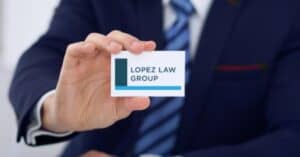Florida Entity Formation Lawyer
Florida Attorneys
Serving You and The State of Florida
So, you’re thinking about starting a business in Florida. Good for you. Seriously. It takes guts to ditch the 9-to-5 and build something yourself. But let’s be real: the dream of being your own boss comes with a less-than-dreamy pile of legal paperwork.
Florida’s sunny disposition attracts entrepreneurs from around the nation. This means lots of opportunity, but also lots of rules you need to follow. Getting your business structure right from day one i mean laying the foundation for everything that follows.
Messing it up? That leads to headaches you don’t want, involving your personal assets, taxes, and a whole lot of bureaucratic nonsense. We help people get this stuff right.
Need help sorting through the legal maze of starting your Florida business? Call Lopez Law Group’s Florida entity formation lawyer at (727) 933-0017.
Florida Entity Formation Guide
- Florida’s Business Gold Rush: More Than Just Sunshine
- Choosing Your Business Armor: LLC, Corporation, or Something Else?
- The Nitty-Gritty: Filing, Fees, and Florida Formalities
- Common Pitfalls When Starting a Florida Business (And How to Sidestep Them)
- Why Us? Lopez Law Group in St. Petersburg
- Beyond Formation: Staying Compliant in the Sunshine State
- Build Your Florida Business on Solid Ground with Lopez Law Group
Florida’s Business Gold Rush: More Than Just Sunshine

Florida Entity Formation Lawyer,
Sean Lopez
It’s no secret that Florida is booming. People are flocking here, businesses are setting up shop, and the entrepreneurial spirit is alive and well. The state saw a massive surge in business applications starting around 2020, mirroring a national trend.
In fact, average annual U.S. business applications jumped nearly 90% between 2020-2022 compared to the previous decade. Florida is a big part of that story. People see opportunity here, a favorable business climate, and maybe they just want better weather while they build their empire.
But this gold rush comes with its own set of challenges. More businesses mean more competition, yes, but also more regulatory attention. The state wants its cut, and it wants things done by the book. That book is thick, written in legalese, and changes more often than you’d think.
You’re not simply filing any old form; you’re making strategic decisions with long-term consequences. It’s about protecting yourself, your family, and your future profits. Ignoring the details now almost guarantees problems later.
Choosing Your Business Armor: LLC, Corporation, or Something Else?
Let’s talk structure. This is one of the first big decisions you’ll make, and it dictates how your business is taxed, who’s liable if things go south, and how much paperwork you’ll be drowning in.
The Limited Liability Company (LLC)
This is the crowd favorite for many small businesses, and for good reason. An LLC offers a shield between your personal assets (house, car, savings) and your business debts or lawsuits. If the business gets sued, generally, they cannot come after your personal stuff.
Tax-wise, LLCs are typically flexible. By default, profits and losses “pass through” to the owners’ personal income taxes, avoiding the “double taxation” corporations sometimes face. Florida outlines the rules for LLCs in the Florida Revised Limited Liability Company Act (Chapter 605, Florida Statutes).
Downsides? Maybe less attractive to serious investors compared to a corporation, and the rules around ownership transfer are often more complex depending on your operating agreement (which you absolutely should have).
The Corporation (S Corp vs. C Corp)
Corporations are often seen as more formal, more established. They offer that same liability protection as LLCs – separating business and personal assets is a key feature.
The big difference lies in taxation and structure. A C Corporation is its own taxable entity. It pays corporate income tax, and then if dividends are distributed to shareholders, those shareholders pay income tax again (hence, “double taxation”). However, C Corps offer more flexibility in stock classes and are often preferred by companies seeking venture capital.
An S Corporation is a tax designation, not a separate legal entity type like an LLC or C Corp. You can form a corporation (or sometimes an LLC) and elect S Corp status with the IRS. This allows profits and losses to be passed through to owners’ personal income, similar to an LLC, avoiding double taxation while retaining the corporate structure.
Corporations generally involve more administrative upkeep: regular board meetings, minutes, more stringent record-keeping. The Florida Business Corporation Act (Chapter 607, Florida Statutes) lays out the requirements.
Partnerships
If you’re going into business with someone else, you might consider a partnership. There are different types:
- General Partnership (GP): All partners share in management and liability. Easy to form, but risky – each partner is personally responsible for all business debts, regardless of who incurred them.
- Limited Partnership (LP): Has at least one general partner (manages the business, has personal liability) and one or more limited partners (investors, limited liability, no management role).
- Limited Liability Partnership (LLP): Often used by professional groups (like lawyers or accountants). Partners generally aren’t personally liable for the malpractice of other partners, but rules vary.
Partnerships require clear agreements outlining responsibilities, profit/loss distribution, and what happens if someone leaves. Without one, you’re inviting disputes.
Sole Proprietorship
This is the default if you start doing business by yourself without forming a separate entity. It’s simple – no state filing required to create it (though you might need licenses or permits). But there’s zero separation between you and the business. Your personal assets are completely on the line.
For anyone serious about building a lasting business, the lack of liability protection makes a sole proprietorship a less-than-ideal choice.
The Nitty-Gritty: Filing, Fees, and Florida Formalities

Okay, you’ve agonized over the entity type. Now you actually have to make it official with the State of Florida. This means paperwork, fees, and paying attention to details.
Filing the Formation Documents
Depending on your chosen structure, you’ll file specific documents with the Florida Division of Corporations, usually through their online portal, Sunbiz.
- LLCs: File Articles of Organization.
- Corporations: File Articles of Incorporation.
These documents typically include basic information: your business name, principal address, the name and address of your Registered Agent, and sometimes the names of managers or directors.
The Registered Agent Requirement
Every Florida LLC and corporation must designate a Registered Agent. This is a person or entity physically located in Florida who agrees to accept official mail and legal documents (like lawsuit papers) on behalf of your business during business hours.
It can be an individual resident of Florida (including yourself, if you meet the requirements), or another business entity authorized to transact business in Florida. Using a dedicated Registered Agent service is common, ensuring someone is always available to receive important documents.
Sunbiz is Your Friend (Mostly)
Florida’s Division of Corporations runs the Sunbiz website. This is where you’ll handle most of your state-level business filings: initial formation, annual reports, name changes, etc. It’s fairly user-friendly, but you need to know what you’re doing and what information is required.
Annual Reports: Don’t Forget!
Once formed, your Florida LLC or corporation must file an Annual Report every year between January 1st and May 1st. This report updates or confirms your business information, like addresses and Registered Agent details. Missing the deadline results in penalties, and failing to file eventually leads to the state administratively dissolving your business.
Think of it as the state’s way of making sure you’re still alive and kicking (and paying your fees).
What’s in a Name? Fictitious Names (DBA)
If you plan to operate your business under a name different from its legal name (e.g., “John Smith LLC” doing business as “Sunshine Lawn Care”), you need to register that name as a Fictitious Name, sometimes called a “Doing Business As” or DBA.
This involves a separate filing and publication requirement under the Fictitious Name Act (Chapter 865, Florida Statutes). It lets the public know who is actually behind the business name.
Fees, Fees, Fees
Yes, there are fees involved. Filing Articles of Organization or Incorporation, registering a Fictitious Name, filing Annual Reports – they all cost money. The amounts vary depending on the entity type and the specific filing, and they can change. Check the Sunbiz website for current fee schedules.
Common Pitfalls When Starting a Florida Business (And How to Sidestep Them)

Building a business is hard enough without shooting yourself in the foot with easily avoidable legal mistakes. Plenty of eager entrepreneurs stumble right out of the gate.
Picking the Wrong Entity Type
We covered this, but it bears repeating because it’s foundational. Choosing a sole proprietorship when you need liability protection, or a C Corp when an S Corp or LLC makes more tax sense, creates problems down the road. This isn’t a “one size fits all” decision.
DIY Disasters with Formation Documents
Trying to save a few bucks by filling out the forms yourself without fully grasping the implications often backfires. Errors on your Articles, incorrect Registered Agent information, or failing to include required details lead to rejection by the state or create internal inconsistencies.
Ignoring Internal Governance Documents
For LLCs, this means not having a comprehensive Operating Agreement. For corporations, it’s skipping the Bylaws. These documents are the internal rulebooks for your business. They define ownership percentages, profit distribution, management structure, and how key decisions are made.
Without them, you’re relying on default state rules, which might not suit your situation at all. Worse, disagreements among owners escalate into nasty, expensive disputes with no clear resolution process.
Compliance Failures: Annual Reports and More
Forgetting to file your Annual Report is a classic blunder. It leads to late fees and potential dissolution. Other compliance issues include failing to maintain a valid Registered Agent, not holding required corporate meetings (and documenting them), or mixing personal and business funds (which pierces the liability shield).
Messing Up Fictitious Name Requirements
Operating under an unregistered DBA leads to legal issues, including the inability to enforce contracts under that name in court. Ensure you follow the registration and publication rules if you use a name other than your legal entity name.
Not Planning for the Future
What happens if a partner wants out? How will ownership transfer if you want to sell or retire? Good formation planning includes thinking about these future scenarios and building mechanisms into your governing documents to handle them smoothly.
Why Us? Lopez Law Group in St. Petersburg

Okay, so you know forming a business involves more than just a cool idea and a website. You need to handle the legal structure correctly. Why should you talk to Lopez Law Group?
Let’s cut to the chase. We’re a Florida law firm based right here in St. Petersburg, serving businesses throughout the Tampa Bay region. We handle business entity formation regularly. It’s a core part of what we do.
Our team, including attorneys like Anthony Lopez, Sean Lopez, and partner Charlie, works directly with entrepreneurs and business owners. Clients often mention Sean Lopez’s professionalism and clear communication, especially when dealing with LLC formations or landlord/tenant issues, which often go hand-in-hand with business property.
Charlie has a strong record in commercial litigation and construction law, bringing valuable perspective if your business involves contracts or real estate development. We see the whole picture.
What sets us apart?
- Broad Scope: We don’t just form your entity and wave goodbye. Our practice areas include commercial and residential real estate, business law (obviously), landlord/tenant law, probate, and even HOA matters. This means we understand how different legal areas intersect for business owners.
- Practical Experience: We handle both the setup (transactional) and the cleanup (litigation). We’ve seen where things go wrong, which helps us advise you on setting things up right from the start.
- Client Focus: Read our client testimonials. You’ll see words like “diligence,” “professionalism,” and “peace of mind.” We aim to take the legal stress off your plate so you can focus on actually running your business.
- Local Presence: Being in St. Petersburg means we understand the local business environment and are accessible to clients in the area. We’re part of this community, located at 700 7th Ave N Suite A, St. Petersburg, FL 33701.
We’re lawyers who focus on providing solid, ethical legal services for Florida businesses. We help you build your company on a firm legal foundation.
Beyond Formation: Staying Compliant in the Sunshine State
Getting your LLC or corporation registered is just the first step. Running a business means ongoing compliance. You must not just file the papers and forget about the legal side of things.
As mentioned before, the Annual Report filing is non-negotiable. Mark it on your calendar. Set reminders. Missing the May 1st deadline causes unnecessary headaches and costs.
Keep your records straight. Maintain a separate bank account for the business. Document major decisions, especially if you have partners or shareholders. If you’re a corporation, hold those required meetings and keep minutes.
Laws also change. For a while, many businesses were concerned about the federal Corporate Transparency Act and its Beneficial Ownership Information (BOI) reporting rules. While a court ruling currently exempts many U.S. companies from these federal filings as of early 2024, the situation highlights how regulations shift. (Note: Foreign entities doing business here might still have reporting duties).
Staying informed about state and federal requirements that affect your business is part of the deal. This includes tax obligations, employment laws (if you have staff), licensing renewals, and industry-specific regulations.
Maintaining your entity’s good standing with the state protects the liability shield you worked to create. It shows you’re operating a legitimate, separate business, not just a personal piggy bank.
Build Your Florida Business on Solid Ground with Lopez Law Group
Starting a business is an act of optimism, maybe even a little bit of defiance. You’re betting on yourself. Don’t let preventable legal mistakes derail your vision before it even gets going.
We get it. You want to focus on your product, your service, your customers. Let us handle the legal framework.
Ready to get your Florida business formation done right? Reach out business attorney in St. Petersburg, FL at Lopez Law Group. Call today at (727) 933-0017.
Practice Areas
- Business Lawyers
- Residential Real Estate Lawyers
- Commercial Real Estate Lawyers
- DUI Lawyers in Florida
- Expunction and Sealing Lawyers
- Florida Clemency
- Injunction Lawyers
- Tenant Lawyers
- Landlord Lawyers
- HOA Lawyers
- Defamation Lawyers
- Eviction Attorneys
- Moving Company Dispute Lawyers
- Probate Lawyers in Florida
What Our Clients Say
A Godsend
Mr. Lopez was a Godsend and really helped me with my situation. Him and the entire firm were very diligent and helped speed the early stages of the process along due to a pressing situation. Throughout my experience working with the firm, they were always responsive and available any time I had a question or wanted to check on the state of affairs. Hopefully I won’t have to recommend Lopez Law Group to my friends or family, but if those unfortunate circumstances arise then there’s only one name I would trust. Thank you again for all your help!
Lopez Law Group Can See You Through Cases Like:
Don't See What You Need?
Lopez Law Group
700 7th Ave N, Suite A,
St. Petersburg, FL 33701
P: 727-933-0015
Business Hours
Mo, Tu, We, Th, Fr
Schedule a Call Back
Book a Consultation






















